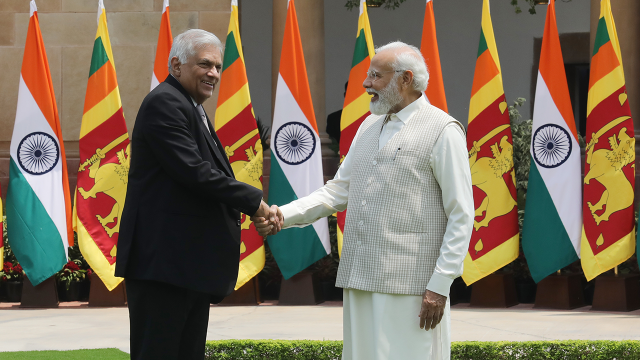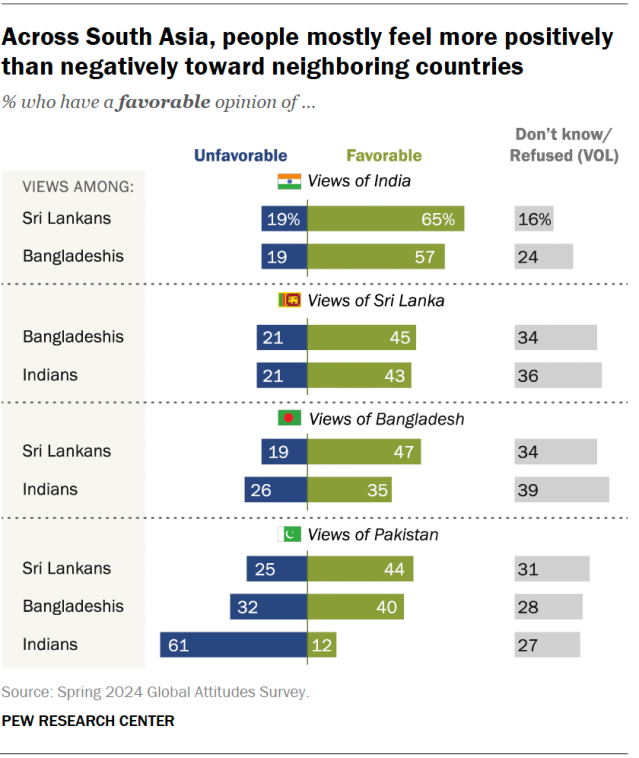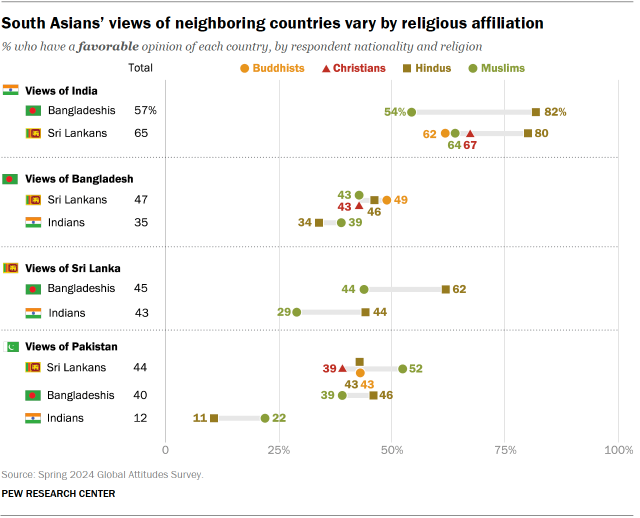
South Asians tend to view other countries in their region more positively than negatively. But views vary by religion, particularly when it comes to opinions of India and Pakistan. This data comes from a Pew Research Center survey conducted Jan. 5-March 25, 2024.
This Pew Research Center analysis focuses on how adults in Bangladesh, India and Sri Lanka view other countries in South Asia.
This analysis draws on nationally representative surveys of 7,124 adults conducted from Jan. 5 to March 29, 2024. Surveys were conducted face-to-face in Bangladesh, India and Sri Lanka. We were unable to survey in Pakistan this year.
In each country surveyed, only religious groups with large enough sample sizes for analysis are included.
To compare educational groups across countries, we standardized education levels based on the UN’s International Standard Classification of Education (ISCED).
Here are the questions used for this analysis, along with responses, and the survey methodology.

We asked these questions to explore regional dynamics in South Asia. Since the 1947 Partition of British India, there have been historical, geopolitical and religious tensions in the region. We surveyed adults in Bangladesh, India and Sri Lanka but were unable to survey in Pakistan this year.
Views of India
Sri Lankan and Bangladeshi views of India are largely positive: 65% of Sri Lankans have a favorable view of India, and 57% of Bangladeshis say the same. (We only asked people in each country about their views of other countries, not of their home country.)
In Bangladesh, opinions vary by support for the ruling party at the time of the survey, the Bangladesh Awami League. The survey was fielded before former Prime Minister Sheikh Hasina resigned and fled to India this month. Supporters of her party are more likely than nonsupporters to view India favorably (71% vs. 49%).
Views also vary by education. In both Bangladesh and Sri Lanka, adults with more education are more likely than those with less education to express a positive view of India. Adults with more education are also more likely to offer any opinion.
Views of Sri Lanka
Bangladeshis and Indians are about twice as likely to have favorable views of Sri Lanka as they are to have an unfavorable opinion. However, around a third of people in both places didn’t answer the question.
Indian adults who support Prime Minister Narendra Modi’s National Democratic Alliance (NDA) are more likely than nonsupporters to have favorable views of Sri Lanka (46% vs. 39%). (The survey took place after Sri Lankan President Ranil Wickremesinghe’s visit to India in July 2023.) Similarly, in Bangladesh, supporters of the former governing party were more likely than nonsupporters to express a positive opinion of Sri Lanka.
Among Bangladeshis, views of Sri Lanka also vary by education. Bangladeshis with higher levels of education are more likely than those with less education to say they have a favorable view of Sri Lanka (60% vs. 42%). Adults with higher education are also more likely to provide a response.
Views of Bangladesh
Views of Bangladesh are more positive than negative across India and Sri Lanka. Roughly half of Sri Lankan adults (47%) hold a favorable opinion of Bangladesh, as do about a third in India (35%).
But large shares in both countries answered “don’t know” or didn’t answer the question. In fact, that share in India is larger than the shares who said they either have a favorable or unfavorable view of Bangladesh. The survey was fielded before deadly clashes between Bangladeshi police and student protesters in July.
Views of Pakistan
Compared with their opinions of India, Bangladesh and Sri Lanka, South Asians’ views of Pakistan are more mixed:
- Sri Lankans view Pakistan more favorably than not (44% vs. 25%).
- In Bangladesh, 40% view Pakistan favorably, and 32% view it unfavorably.
- Indians, on the other hand, are more unfavorable (61%) than favorable (12%) toward Pakistan. And 51% say they have very unfavorable views of Pakistan.
Indians have viewed Pakistan unfavorably since we first asked this question in 2013. No more than two-in-ten Indian adults have expressed a favorable view of Pakistan in that time. Relations between India and Pakistan have been strained since the 1947 Partition of British India split the country into independent India and Pakistan.
Indians who do not support the NDA are more likely than supporters to have favorable views of Pakistan (15% vs. 9%).
Views by religion
Across the three South Asian countries surveyed, views of other countries in the region often vary by religion.
In both Bangladesh and Sri Lanka, Hindus are more likely than other religious groups to have favorable views of India. For example, in Sri Lanka, eight-in-ten Hindus express a positive opinion of India, compared with fewer than seven-in-ten Buddhists, Christians and Muslims.
In Bangladesh and India, Hindus also tend to have more positive views of Sri Lanka than Muslims do. For example, 62% of Hindus in Bangladesh say they view Sri Lanka favorably, compared with 44% of Muslims.
Indian Muslims stand out from Hindus for being twice as likely to have any opinion of Pakistan (22% vs. 11%).

Note: Here are the questions used for this analysis, along with responses, and the survey methodology.
CORRECTION (Sept. 13, 2024): In an earlier version of this post, we inaccurately described the timing of the survey relative to Wickremesinghe’s visit to India.
